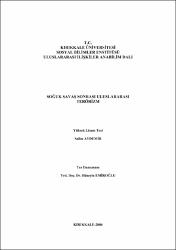Soğuk savaş sonrası uluslararası terörizm
Özet
ÖZETBu çalışmanın amacı, 1990 sonrası terörizmin evrimini anlamaya çalışmak veuluslararası güvenlik için oluşturduğu tehdidi ortaya koymaktır. Yüzyıllardır toplumlarıngüvenliği için tehdit oluşturan terörist eylemlerin iki kutuplu dönem sonrasında dünyagündemine taşınmasında terörün nitelik değiştirerek etki alanını genişletmesi ve tehditboyutunu artırması etkili olmuştur. Bu çerçevede çalışmada, Soğuk Savaş sonrası uluslararasıterörizm olgusunun yükselişi analiz edilmeye çalışılacaktır. Terörizm olgusunun dönüşümünüiyi kavrayabilmek için öncelikli olarak tarihsel süreç içerisindeki yerini, karakteristiközelliklerini ve diğer kavramlarla ilişkisinin irdelenmesi gerekmektedir. Çalışmanın ilkbölümünde bu noktalar ele alınmıştır.İkinci bölümde terörizmin, Soğuk Savaşın bitmesiyle beraber girmiş olduğu değişimsüreci nedenleri ile birlikte ayrıntılı bir şekilde açıklanmaya çalışılacaktır. 11 Eylül teröreylemi ile beraber terörizmin geldiği boyut üzerinde durulacaktır. Ayrıca terörizmin yaşattığıtüm felaketlere rağmen bazı devletler tarafından bir dış politika aracı olarak kullanıldığıvurgusu yapılacaktır.Üçüncü bölümde uluslararası terörizmle mücadele konusu ele alınacaktır. Uçakkaçırma, gemi kaçırma, uluslararası alanda korunan kimselere karşı suçların önlenmesi vecezalandırılması için çok taraflı sözleşmeler yapılmıştır. Ancak bunlar yeterli değildir.Terörizme karışan grupları uluslararası alanda denetleyecek, yargılayabilecek vecezalandıracak düzenlemelerde yeterli seviyeye ulaşılamamıştır. Uluslararası işbirliğiolmadan terörle mücadelede başarı zor görünmektedir. Bundan dolayı Birleşmiş Milletlerçerçevesinde tüm ülkelerin katılımı ile yeni uluslararası anlaşmalar yapılmalıdır. Çalışmanınsonuç kısmında genel bir değerlendirme yapılarak terörün önlenmesi için önemli kabul edilenhususlar vurgulanacaktır.I ABSTRACTThis study aims at analyzing the evolution of terrorism after 1990 and demonstratingthe threat it poses for international security. Terrorists activities have become one of the mostimportant issues in international agenda in the post-Cold War period, because terrorism hasexpanded its influence and has become a more dangerous threat for world security and peace.In this context, the study tries to analyze the rise of international terrorism in the post-ColdWar period. In order to understand the transformation of terrorism, it is necessary to study itsplace in historical context, its characteristics and its relation with other concepts. In the firstpart of the thesis, these points are studied.In the second part, the transformation process which terrorism went through at the endof the Cold War and its reasons are explained in detail. The point which terrorism has reachedwith the September 11 attacks is also considered in this part. It is emphasized that terrorism isused as a foreign policy despite the fact that it has caused great calamity.In the part of the paper, counterterrorism (struggle against international terrorism) isstudied. Multinational pacts have been made to prevent and respond to terrorist acts such ashijacking, and assault on diplomats and diplomatic facilities. But these steps are not sufficient.Arrangements which have been made to control and punish groups involved in terrorism, arenot sufficient yet. Without international cooperation, it is difficult to fight against terrorism.Therefore, international agreements should be signed with the participation of all the statesunder the auspices of the the United Nations. In the conclusion part, some of the importantmeasures to be taken to prevent terrorist attacks are pointed out besides a general evaluation.II
















